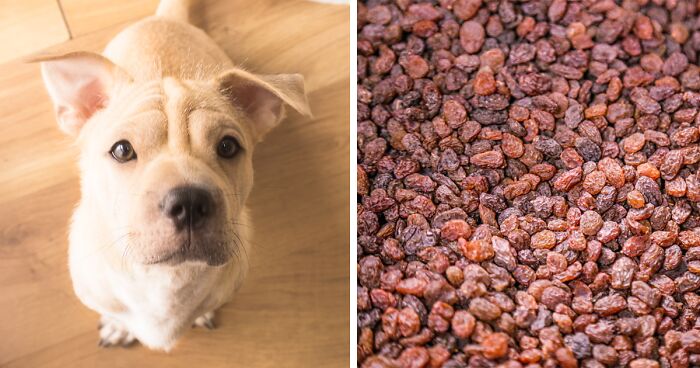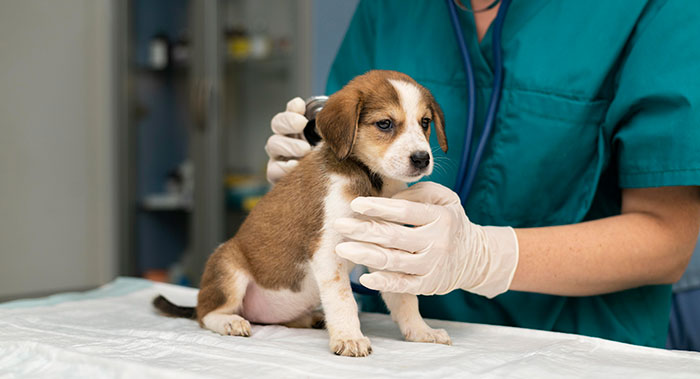Our four-legged companions have a knack for sniffing out the most unexpected treats, but only some things that fall from our tables are safe to devour.
Grapes and raisins, while seemingly harmless, have been the subject of much debate in the dog-loving community. Let’s dive into the grapevine and answer some burning questions about our furry friends and these sweet treats.
- Raisins and grapes can be toxic to dogs.
- Even a single raisin can be harmful.
- Ingestion can lead to acute kidney failure.
- Immediate vet intervention is crucial.
- Swift action needed after ingestion.
The information provided herein is for informational purposes only. Please refer to our disclaimer for more details..
- Can Dogs Eat Grapes and Raisins? The Risks Unveiled
- The Unknown Culprit: What Makes Grapes and Raisins Toxic?
- What Happens if a Dog Eats 1 Raisin?
- What if My Dog Ate Raisin Bread?
- How Long Does it Take for a Dog to Show Signs of Poisoning?
- Can a Dog Recover from Poisoning on its Own?
- What to Do if Your Dog Ate Grapes or Raisins: A Quick Guide
- Are Raisins the Only Thing That Causes Poisoning in Dogs?
- In Conclusion: Raisins Are Bad For Dogs
Can Dogs Eat Grapes and Raisins? The Risks Unveiled
Image credits: nikitabuida
Picture this: Your pup snatches a single raisin from the kitchen floor. Is it cause for concern? Absolutely. Grapes and raisins, in any quantity, have the potential to be toxic to our canine companions. It’s not just the grape but the raisin, its dried counterpart that poses a threat.
The Unknown Culprit: What Makes Grapes and Raisins Toxic?
The toxic substance remains unidentified, adding an air of mystery to the dangers associated with these seemingly innocent dried grapes, but we know some things about what happens. However, this lack of clarity emphasizes the urgency of seeking professional help if your dog has consumed these fruits.
When a dog ingests raisins, a cascade of potentially harmful mechanisms is set in motion within their body. Upon consumption, the gastrointestinal tract first becomes the battleground for the toxic encounter.
The toxic components in raisins can lead to irritation, inflammation, and damage to the lining of the stomach and intestines. This irritation often manifests in symptoms like vomiting and diarrhea, early warning signs that the body is reacting to the foreign invader.
However, the most alarming consequence arises in the kidneys. Raisin toxicity has been strongly linked to acute kidney failure in dogs. The precise mechanism by which raisins induce kidney damage remains unknown.
But we know that as the bloodstream carries the components of raisin toxicity, they infiltrate the network of tiny blood vessels within the kidneys. This infiltration can disrupt normal kidney function, impairing the organ’s ability to filter and excrete waste products from the blood.
The unpredictability of when symptoms manifest adds an extra layer of complexity, emphasizing the importance of immediate veterinary attention if you suspect your favorite pup ingested raisins. Immediate therapy is necessary to mitigate the potentially severe consequences of raisins.
What Happens if a Dog Eats 1 Raisin?
Image credits: freepik
As the exact toxic dose isn’t precisely defined, even a single raisin can spell trouble for your furry friend. The consequences of raisin ingestion can range from mild gastrointestinal upset to severe issues like kidney failure. The reaction varies from dog to dog, making it crucial to treat any grape or raisin ingestion seriously, even if it is just a single raisin.
What if My Dog Ate Raisin Bread?
Raisin bread might seem like a harmless snack, but it carries the same risks as plain raisins. The concentration of raisins in raisin bread can vary, making it challenging to gauge the potential toxicity.
If your dog has nibbled on raisin bread, we recommend you contact your veterinarian as soon as possible.
How Long Does it Take for a Dog to Show Signs of Poisoning?
The timeline from ingestion to the onset of symptoms of grape toxicity in dogs can be unpredictable. In some cases, dogs may display signs within a few hours, while in others, it might take up to 72 hours.
Early symptoms include:
- Vomiting
- Diarrhea
- Lethargy (lack of energy)
- Loss of appetite.
Can a Dog Recover from Poisoning on its Own?
Image credits: freepik
The short answer is no. Unlike some substances a dog’s system can process, grape and raisin toxicity often requires immediate veterinary intervention.
If you suspect your dog ate a grape or raisins, even if it is just one grape, waiting for symptoms to appear is not an option. Contact your veterinarian immediately for guidance.
What to Do if Your Dog Ate Grapes or Raisins: A Quick Guide
Contact Your Veterinarian:
Immediate communication with your vet is crucial. They can guide you on the next steps based on your dog’s size, the quantity ingested, and other individual factors associated with your unique dog.
Induce Vomiting:
Veterinarians employ a multi-faceted approach, including inducing vomiting if ingestion has occurred recently, which means within the last couple of hours. Vomiting will remove the culprit from the stomach, thereby minimizing the risk of adverse reactions occurring as a response to the raisins or grapes.
Activated Charcoal:
Administering activated charcoal may help limit the absorption of toxic substances. Activated charcoal is a highly adsorbent substance with an increased surface area, making it effective in binding to and trapping various chemicals and toxins. Unlike absorbent materials, activated charcoal attracts and binds toxins on its surface. In cases of poisoning or toxic ingestion, activated charcoal is administered through the mouth. As it moves through the digestive system, it acts like a magnet, binding to toxic substances and preventing or reducing their absorption into the bloodstream. The charcoal uptake limits harmful substances’ impact on the body. However, it’s essential to note that activated charcoal is not universally effective for all toxins, and its use depends on factors such as the type of toxin, the time since ingestion, and the patient’s overall health.
Fluid Therapy:
Hospitalization at an animal hospital might be necessary if it’s been more than a few hours since ingestion. Treatment then often involves intravenous fluids to support kidney function and flush out the toxins.
Monitoring:
Your dog may need close monitoring for at least 48 hours. Continuous monitoring, often involving blood and urine tests, helps assess the severity of kidney damage. The goal is to stabilize the dog, mitigate potential complications, and enhance the chances of a successful recovery.
Are Raisins the Only Thing That Causes Poisoning in Dogs?
Raisins and grape poisoning are not the only things you should keep in mind and avoid giving your dog. Several everyday household items can be toxic to dogs, and pet owners must be aware of these potential dangers. Some examples include:
- Chocolate: Contains theobromine, which can be toxic, especially in dark chocolate.
- Xylitol: A substance found in sugar-free gum, candy, and peanut butter. Xylitol can cause insulin release, leading to severe low blood sugar and liver failure.
- Onions and Garlic: Contain compounds that can damage a dog’s red blood cells, leading to a loss of red blood cells (anaemia).
- Caffeine: Found in coffee, tea, and some medications, caffeine can cause restlessness, increased heart rate, and tremors.
- Alcohol: Even small amounts can cause alcohol poisoning in dogs, leading to vomiting, coordination problems, and respiratory issues.
- Avocado: Contains a substance called persin, which can cause vomiting and diarrhea in dogs.
- Macadamia Nuts: Can cause weakness, vomiting, and overheating (hyperthermia) in dogs.
- Medications: Some human medications, such as pain relievers, antidepressants, and specific vitamins, can harm dogs.
It’s essential for dog owners to keep these items out of reach and contact a veterinarian immediately if accidental ingestion occurs. The severity of toxicity can vary, so swift action is crucial for the well-being of your furry friend. If you are unsure whether something is poisonous to dogs, you can always contact an animal poison control center or a pet poison helpline.
In Conclusion: Raisins Are Bad For Dogs
Grapes and raisins are so dangerous for our furry companions that even a tiny amount can lead to severe consequences. If you suspect your dog has ingested any quantity of grapes or raisins, contact your veterinarian immediately. The prognosis depends on various factors, and early intervention significantly improves your dog’s chances of recovery.
Remember, it’s always better to be safe than sorry when it comes to grapes and raisins. Keep these sweet treats out of your dog’s reach, and if an accidental ingestion occurs, swift action is the key to a happy, healthy tail-wagger.
121views
Share on FacebookExplore more of these tags
ALSO toxic to dogs: chocolate, citrus (oranges, lemons etc.), onions, garlic, chives, xylitol (common in many chewing gum brands AND sometimes in peanut butter!), caffeine, avocado, alcohol, macadamia nuts, poinsettia plants, and rhubarb. ALWAYS google "is xyz toxic to dogs" before you feed your dog "people food", always check the ingredients in case of sneaky caffeine or xylitol, and ALWAYS check the ASPCA Toxic Plants List before you leave that dieffenbachia houseplant within doggo's reach. Essential oils, ESPECIALLY citrus oil and tea tree oil, are toxic to dogs. I'm not a vet, but I have extensively researched toxic-to-dogs foods and plants and I check multiple sources. When in doubt, DO NOT feed it to your dog!
Guessing this is the one? https://www.aspca.org/pet-care/animal-poison-control Used this for plants! really good. And today I found out they also have other things toxic!
Load More Replies...ALSO toxic to dogs: chocolate, citrus (oranges, lemons etc.), onions, garlic, chives, xylitol (common in many chewing gum brands AND sometimes in peanut butter!), caffeine, avocado, alcohol, macadamia nuts, poinsettia plants, and rhubarb. ALWAYS google "is xyz toxic to dogs" before you feed your dog "people food", always check the ingredients in case of sneaky caffeine or xylitol, and ALWAYS check the ASPCA Toxic Plants List before you leave that dieffenbachia houseplant within doggo's reach. Essential oils, ESPECIALLY citrus oil and tea tree oil, are toxic to dogs. I'm not a vet, but I have extensively researched toxic-to-dogs foods and plants and I check multiple sources. When in doubt, DO NOT feed it to your dog!
Guessing this is the one? https://www.aspca.org/pet-care/animal-poison-control Used this for plants! really good. And today I found out they also have other things toxic!
Load More Replies...
 Dark Mode
Dark Mode 

 No fees, cancel anytime
No fees, cancel anytime 


















































-2
2